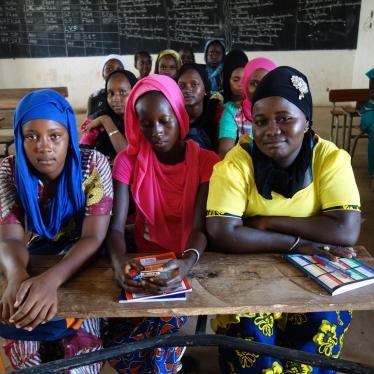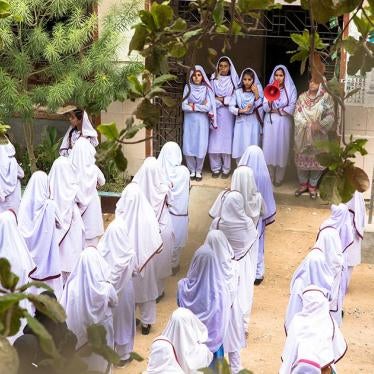(Nairobi) – The constitutional changes that the people of Equatorial Guinea are asked to approve will strengthen the near-absolute powers of President Teodoro Obiang Nguema Mbasogo and further deprive citizens of their civil and political rights, EG Justice and Human Rights Watch said today. A referendum on the changes is scheduled for November 13, 2011.
The proposed constitutional changes would enable Obiang, the longest-serving leader in Africa, to hand-pick his successor and to retain significant political influence even after he leaves office. Under the current constitution, the office of the president already wields considerable control over the executive, legislative, and judicial branches of government. The proposed changes, which the government of Equatorial Guinea claims will create more democratic institutions, will in practice expand the president’s influence, entrenching his power and further institutionalizing a lack of checks and balances among the three branches of government, the groups said.
“The constitutional reform process could have corrected flaws in the political system to make it more democratic,” said Tutu Alicante, executive director of EG Justice, a nongovernmental group that promotes good governance in Equatorial Guinea. “These are not progressive reforms but instead entrench unchecked presidential power and deny the people of Equatorial Guinea the opportunity to take meaningful part in decisions affecting their lives.”
The current constitution grants the president's office extensive powers that Obiang has abused to dominate the nation’s affairs without constraint, EG Justice and Human Rights Watch said. The president exercises heavy influence over members of the legislature and judiciary, undermining the potential of these branches to act as a check on his power. The ruling party, and other parties aligned with it, control 99 of 100 seats in parliament. The legislature almost exclusively acts under the direction or at the request of the presidency and consistently rubber-stamps presidential initiatives.
Although the constitution nominally recognizes the principle of judicial independence, it designates the president as the “chief magistrate” of the country and permits him to name Supreme Court justices and others without parliamentary approval. The International Bar Association, following a visit to Equatorial Guinea in 2003, concluded that, “The courts are not independent and impartial,” citing in part “direct intervention from the president in order to protect his personal interests” and expectations that judges demonstrate “loyalty” to the government.
Multiple sources indicate that the situation remains unchanged. Lawyers in Equatorial Guinea interviewed by EG Justice in 2011 said that judges assigned to sensitive cases concerning human rights or national security regularly tell the lawyers that the judges needed to consult with the office of the president regarding their decisions.
The proposed constitutional changes would expand the power of the president’s office in several respects. Although they introduce term limits on the presidency that permit two consecutive seven-year terms in office, they remove the existing maximum age limit for the presidency, under which 69-year-old Obiang would have been ineligible to run after age 75.
The changes would create a vice presidential post filled at the president’s discretion. This would allow Obiang to appoint his second-in-command, who would automatically assume the presidency if Obiang retires, dies in office, or is incapacitated. He is widely expected to name his eldest son, Teodoro Nguema Obiang Mangue (known as “Teodorín”), who is currently the subject of foreign corruption and money-laundering investigations in France, Spain, and the United States.
The changes also would extend the president’s considerable power by allowing him to chair the body that controls judges, the Supreme Council on Judicial Power, as well as to appoint an unspecified number of members of a newly created Senate and of a new “independent” agency on government finances. The president would also approve the selection of a new ombudsman tasked with considering citizen complaints.
And after he leaves office, he would enjoy the status of senator, with the rights and immunity accorded that office, as well as head a new high-level council to advise his successor on national security and other sensitive issues.
The ruling party, which monopolizes political life in the country, is expected to secure an overwhelming vote in favor of the constitutional amendments. Obiang has claimed to have won five presidential elections with at least 95 percent of the vote dating back to 1982, leading numerous foreign governments to criticize electoral processes in the country as lacking credibility.
Details of Proposal Hard to Get
Obiang announced “the advisability of reforming the constitution” in March, after a series of uprisings began against autocratic leaders in North Africa and Arab countries. A May presidential decree stated that his goal was to foster a “broader spectrum of participation of the people in the management of the administration of the good of the community.”
The proposed reforms were developed with little or no consultation with the Equatoguinean people, EG Justice and Human Rights Watch said. Parliaments officially approved the government’s constitutional reform plans in July. But the party of the lone member of parliament not aligned with the ruling Democratic Party of Equatorial Guinea (Partido Democrático de Guinea Ecuatorial, PDGE) said the members approved the package with no discussion and without access to a written copy of the proposal or its details. The opposition party, the Convergence for Social Democracy (Convergencia Para la Democracia Social, CPDS), also said it and other political parties did not receive the full text of the proposed reforms until October 27, one day before the start of campaigning for the referendum.
Despite promises by the government to disseminate the full text widely “so that voters may have information of all its contents,” sources have told EG Justice that it has not been made available in paper copy. An opposition solidarity group in Spain posted the text online in late October, but ordinary citizens’ access to the internet is very limited in the country due to its expense and unreliable electricity.
On October 20, Obiang appointed his son Teodorín to lead the ruling party’s constitutional reform campaign, just one week after the US Department of Justice filed forfeiture complaints to seize more than $70 million of Teodorín’s assets. In September, French police seized a fleet of luxury cars from outside his Paris estate. Teodorín serves as the minister of agriculture and forestry and is vice president of the ruling party.
Opposition Intimidated
Since the campaign period for the constitutional referendum opened on October 28, the Convergence for Social Democracy members campaigning for a “no” vote have faced intimidation and harassment. On November 1, police arrested and held for three days a prominent party figure and civil society activist, Marcial Abaga Barril, on a dubious pretext. On November 3, uniformed police officers and others in street clothes disrupted a party event on the country’s mainland and forced the participants to disperse, a witness told EG Justice.
The opposition is also hampered by the ruling party’s virtual monopoly on power, funding, and access to national media. The dominance of both state media and private media outlets controlled by people close to Obiang assures coverage that heavily favors the ruling party. The government provides campaign financing for all parties, but opposition leaders contend that the public funding available to them is insufficient to conduct a national campaign and that the ruling party unfairly benefits from far greater access to state funds and resources.
Earlier in 2011, appointees from opposition political parties not aligned with the ruling party refused to participate in a national committee appointed to consider Obiang’s reform agenda, citing the lack of information about the government’s proposals and the absence of opportunity for input.
“With the nontransparent process through which these reforms have been developed and the repressive way they are being pushed, the government demonstrates once again its willingness to suppress citizens’ rights at any cost,” Alicante said. “Secrecy and heavy-handed government tactics are not recipes for democracy.”
Rights Commitment
In January, Obiang signed the African Charter on Democracy, Elections and Governance on behalf of Equatorial Guinea, making a commitment to uphold the purpose and objectives of the charter. The charter specifically identifies as objectives promoting and protecting the independence of the judiciary, promoting democratic culture and practice, and building and strengthening governance, including separation of powers. The proposed reforms would undermine these objectives, especially in light of the manner in which Obiang wields power, EG Justice and Human Rights Watch said.
The groups called upon the Commission of the African Union, which has the responsibility to carry out the charter’s commitments and promote “the creation of favorable conditions for democratic governance,” to engage with Equatorial Guinea over the problems with its constitutional reform process. EG Justice and Human Rights Watch said the concerns were all the more troubling given that Obiang holds the rotating African Union presidency until the end of 2011.







